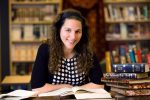A Groundbreaking Woman Rabbi Overcomes Obstacles in Her Path
By Ashlin Leen

Outside a synagogue in Israel not long ago, three star-struck girls eagerly asked Rabbi Lila Kagedan for her autograph.
Their excitement was understandable: Kagedan is the first woman to take the title of rabbi in Judaism’s Orthodox movement.
Kagedan spoke last Wednesday evening at Congregation Sons of Israel in Briarcliff Manor as part of the synagogue’s Rabbi’s Circle program, talking about her journey and struggle to become an Orthodox woman rabbi. Despite always having the desire and drive to pursue the revered title, rabbinical school for Orthodox Jewish women did not exist until recently.
“It came clear to me that were I a male growing up in my parents’ Orthodox home, I would have pursued the rabbinate, but it wasn’t possible for me,” said Kagedan, raised in an Orthodox household in Ottawa, Ont. Coming from “a family of doers” she was taught that, “if it doesn’t exist and you want it, it’s your responsibility to create it.”
As she expressed her frustration regarding the lack of leadership roles for women in Orthodox Judaism, her late father advised her to try to do something productive about it.
So Kagedan, 35, turned her attention to rigorously studying texts under his tutelage. She said he encouraged her to “arm herself with these texts” and that “knowing them intimately would be the only way to gain authority and autonomy.”
Kagedan went on to study Jewish Study and Ethics at the University of Toronto, while continuing to volunteer, teach and function as much in a rabbinical capacity as she could without ordination. However, after graduating, opportunities were closed for her.
“It was clear that there still weren’t options for me in the Orthodox rabbinate. I could only get so far in my training,” Kagedan said.
That changed in 2009 when a school named Yeshivat Maharat, a yeshiva for women in the Bronx, opened with the goal of giving Orthodox women the opportunity to be ordained.
“I felt relief that there would finally be a valid place for me to study and teach and learn and grow,” she said.
Kagedan attended and graduated in its third class in 2015. After her ordination, Kagedan chose to be the first to take the title rabbi, unlike fellow graduates who assumed titles such as “rabba” or “maharat,” which means female leader in Hebrew.
Her decision has been met with controversy and backlash. In the fall of 2015, the Rabbinical Council of America (RCA), the main professional association within the Modern Orthodox movement in the United States which oversees most Orthodox congregations, adopted a policy prohibiting the ordination or hiring of women rabbis by synagogues operating under its jurisdiction.
Kagedan is currently working as a rabbi at the historic Walnut Street Orthodox Synagogue in Chelsea, Mass., which is not under the direction of the RCA, she said.
“I create opportunity for women every way I can,” she said.
Kagedan acknowledges that her pursuit to be on equal standing with her male counterparts has been met with opposition and the need to constantly prove herself. She said she has never considered leaving Orthodox Judaism for another movement because that is how she was raised.
However, Kagedan continues to try to bring change. She hopes her position and presence will normalize women’s leadership and encourage more women to stay in the Orthodox movement.
“While Judaism is influenced by feminism and a U.S. expression of equality, it is slower moving and met with a great deal of resistance because, after all, we’re trying to reconcile a certain ancient philosophy with contemporary norms,” she said.
Kagedan’s efforts have inspired men and women. Marion Saider, who attended the talk last week, said it was important to hear Kagedan speak.
“I think she’s really groundbreaking and a role model for young women,” Saider said.

Examiner Media – Keeping you informed with professionally-reported local news, features, and sports coverage.
